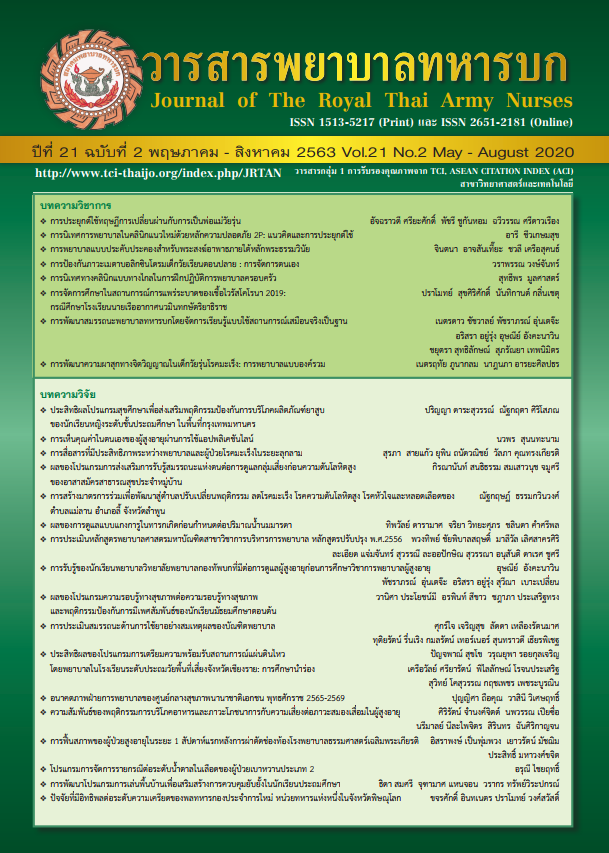How to Communicated in Generation Z Nurses
Keywords:
Generation Z nurses, Nursing team, CommunicationAbstract
The objective of this qualitative research was to describe lived experiences of managing Generation Z nurses in nursing team of head nurses in an university hospital. The informants were head nurses who experienced managing Generation Z nurses in nursing team more than 3 years and Generation Z nurses have worked in their unit at least 3 people. Collecting data by indepth interview in purposive samplings 12 head nurses at an autonomous university hospital. Analyzing data by van Manen’s analysis (1990). The results of this research can describe how to communicated in Generation Z nurses in nursing team 5 points as follow : 1) Various channels to access communication 2) Tell topics clearly and no complexity 3) Easy to access all the time 4) Set priority communicated topics 5) Warn when use unappropriate social online technology.
Downloads
References
Zemke et al. Generation at work: Managing the clash of Veterans, Boomers, Xers, & Nexters in your workplace. New York: Amacon. 2000.
Bell, J. A. Five generations in the nursing workforce: Implications for nursing professional development. Journal of Nurses Professional Development 2013; 29(4): 205-210.
Smith-Trudeau P. Generation Z nurses have arrived. Are you ready? Nursing News 2016; 40(2):13-14.
Tulgan B. Not everyone gets a trophy : how to manage the millennials. New Jersey: Wiley; 2016.
Houwelingen C. et al. Internet-generation nursing students’ view of technology-base health care. Journal of Nursing Education 2017; 56(12): 717-724.
Chansa S. The Effects of Effective Communication and Teamwork on Patient Safety Management of Staff Nurses at One Government Hospital in Bangkok Metropolis. Journal of The Royal Thai Army Nurses 2017; 18 Supplement (Jan - April): 299-307.(in Thai)
Yeh Y. C. The Effects of Contextual Characteristics on team creativity: positive, negative, or still undecided? (Working papers in contemporary Asian studies; No. 38). Centre for East & South-East Asian Studies: Lund University; 2012.
D’Amato A. & Sharabi M. Ed. Generational differences in work values & ethic an international perspective; Values & generational differences among european managers: Fictions, fact & practical reccommendations. New York : Nova Science Publishers, Inc. 2016.
Malloch K, Porter-O’grady T. & Hall C. Eds. The career handoff : A healthcare leader’s guide to knowledge & wisdom transfer across generations. Indiannapolis: Sigma Theta Tau International. 2016.
Sweet J. & Swayze S. The multi-generation nursing workforce: Analysis of psychological capital by generation & shift. Journal of Organization Psychology 2017;17(4):19-28.
Phengjard J. Research methodology: Interpretative phenomenology. Journal of Nursing Science Chulalongkorn University;17(2):10-20. (in Thai).
Holloway I, & Wheeler S. Qualitative research for nurses. Main Street Malden: Blackwell Science Ltd; 1996.
Oumtanee A. Qualitative research in nursing. 3rd edition. Bangkok: Chulalongkorn university; 2016. (in Thai).
Streubert H. J. & Carpenter, D. R. Qualitative reseach in nursing: Advancing the humanistic imperative. Philadelphia: Wolters Kluwer. 2011.
Wieck K. L. & Moss D. K. Managing the intergenerational nursing team. Brentwood, Tennesse : HCPro, a division of BLR; 2015.
Glass A. Understanding generational differences for competitive success. Industrial & Commercial Training 2007; 39(2):98-103.
Christensen S. S, Wilson B. L. & Edelman L. S. Can I relate? A review and guide for nurse managers in leading generations. J Nurs Manag 2018;26(6):689-695.
Feinman C.L. Generation Z : Managing emergencies in a post-millenial world. Master of Arts American Military University;2017.
Kick A. L, Contacos-Sawyer J. & Thomas B. How generation Z’s reliance on digital communication can affect future workplace relationship. Competitive Forum 2015;13(2):214-222
Bencsik A, Horváth-Csikós G, & Juhász T. Y & Z at workplace. Journal of Competitiveness 2016; 8(3):90-106
Chicca J. & Shellenbarger, T. Connecting with generation Z: Approaches in nursing education. Teaching & Learning in Nursing 2018;13(3): 180-184.
Downloads
Published
How to Cite
Issue
Section
License
บทความหรือข้อคิดเห็นใดใดที่ปรากฏในวารสารพยาบาลทหารบกเป็นวรรณกรรมของผู้เขียน ซึ่งบรรณาธิการหรือสมาคมพยาบาลทหารบก ไม่จำเป็นต้องเห็นด้วย
บทความที่ได้รับการตีพิมพ์เป็นลิขสิทธิ์ของวารสารพยาบาลทหารบก
The ideas and opinions expressed in the Journal of The Royal Thai Army Nurses are those of the authors and not necessarily those
of the editor or Royal Thai Army Nurses Association.






